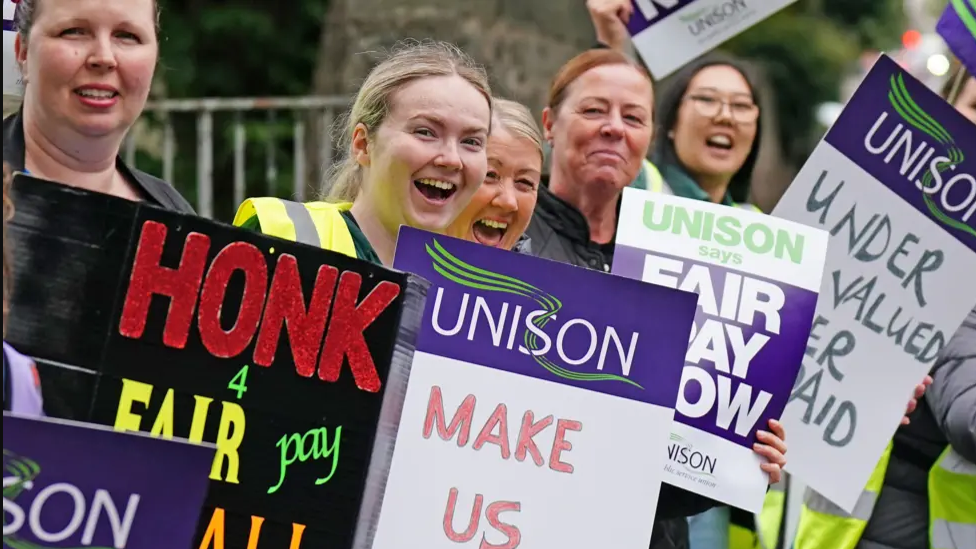'Many' primary schools expected to close during Perth and Kinross strike

- Published
Perth and Kinross Council says it expects "many" primary schools will have to close for a fortnight from next week due to industrial action.
The area, which includes First Minister John Swinney's constituency, is being targeted for action in the national council pay dispute.
The council said it hoped to be able to keep all secondary schools open.
Many non-teaching members of the Unison union in Perth and Kinross will strike for two weeks from next Monday.
The council said it was currently assessing how the industrial action would impact on 50 schools and early learning centres.
It said remote learning would be provided when schools are closed to pupils, as teachers are not taking part in the industrial action.
It said it will close schools and early learning centres where it does not think there will be enough staff to ensure the safety of pupils.
The authority added: "This may also mean that we have to close Intensive Support Provisions (ISPs) in some schools even if the school itself is not closed."
Strikes set to close Perth and Kinross schools for two weeks
- Published8 October 2024
Thousands of Unison members (86%), including waste and recycling workers as well as education staff, turned down the national offer.
That offer was for a £1,292 per year or 3.6% rise – whichever was higher.
It was accepted by the two other big council unions, Unite and the GMB.
Councils across Scotland have agreed to implement the offer, meaning staff should get their rise and back pay soon.
The Scottish government and council leaders have said there is no more money for pay this year.
Finance and Local Government Secretary Shona Robison said: "While this government respects workers’ rights, no one’s interests will be served by industrial action which will disrupt children and young people attending schools and nurseries in Perth and Kinross.
"I hope that Unison members recognise the strength of this offer which has already been accepted by GMB and Unite.”
Unison has also warned it will ballot all its council members across Scotland to see if they will go on strike.
Unison's Perth and Kinross branch secretary Stuart Hope said members were not taking the decision to strike "lightly" and that he hoped parents would understand it was being done for "the right reasons".
He told BBC Scotland News: "If we could call off these strikes then we absolutely would but there has to be a bit of movement from Cosla and the Scottish government first.
"The only way any stalemate can be resolved is by sitting down and discussing things and as I said as far as I’m aware they have shown no appetite to do that so far."

Many council staff in Perth and Kinross are due to strike for a fortnight - but the local authority does not have the power to resolve the dispute.
The strike is about council pay across the whole of Scotland. It is agreed at a national level between the three main council unions and the council body Cosla.
The pay offer – which came amid the threat of widespread bin strikes in the summer – was accepted by members of Unite and the GMB but rejected by Unison. It feels more needs to be done to address the long term decline in the value of council pay.
The union’s decision to call out staff in Perth and Kinross is partly tactical and partly practical. It has a legal mandate for action there and hopes to put pressure on the one man they believe can improve council pay – First Minister John Swinney, who is also a local MSP.
The offer accepted by the two other unions was only made possible after the Scottish government made more resources available to help councils. Cosla and the government are adamant there is no more money available for pay this year.
This action has the potential to widen beyond Perth and Kinross. Unison intends to ballot its members at councils across Scotland, although the law on turnout in strike ballots means a simple majority is insufficient and Unison cannot take the result for granted.
The disruption in Perth and Kinross could be a taste of what is to come elsewhere – or it could prove to be local action on a national issue.
The stakes for Unison, Cosla and the Scottish government are high.